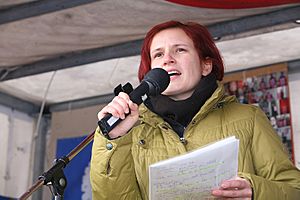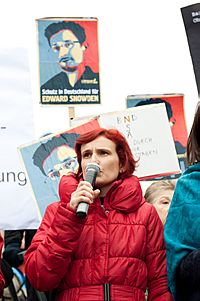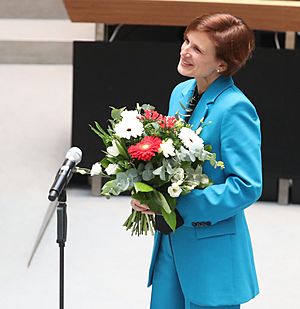Katja Kipping facts for kids
Quick facts for kids
Katja Kipping
Senator a.D. MdL a.D. MdB a.D.
|
|||||||||||||||||||||||||||||||||
|---|---|---|---|---|---|---|---|---|---|---|---|---|---|---|---|---|---|---|---|---|---|---|---|---|---|---|---|---|---|---|---|---|---|
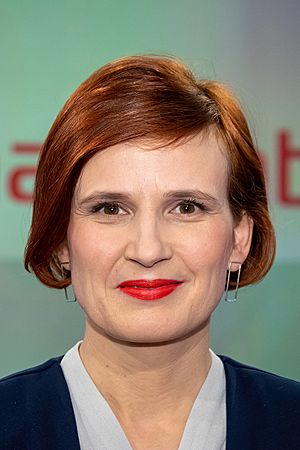
Kipping in 2020
|
|||||||||||||||||||||||||||||||||
| Senator for Integration, Labour and Social Affairs of Berlin | |||||||||||||||||||||||||||||||||
| In office 21 December 2021 – 27 April 2023 |
|||||||||||||||||||||||||||||||||
| Governing Mayor | Franziska Giffey | ||||||||||||||||||||||||||||||||
| Preceded by | Elke Breitenbach | ||||||||||||||||||||||||||||||||
| Succeeded by | Cansel Kiziltepe | ||||||||||||||||||||||||||||||||
| Leader of The Left | |||||||||||||||||||||||||||||||||
| In office 2 June 2012 – 27 February 2021 Serving with Bernd Riexinger
|
|||||||||||||||||||||||||||||||||
| Preceded by | Gesine Lötzsch | ||||||||||||||||||||||||||||||||
| Succeeded by | Janine Wissler | ||||||||||||||||||||||||||||||||
|
|||||||||||||||||||||||||||||||||
| Personal details | |||||||||||||||||||||||||||||||||
| Born | 18 January 1978 Dresden, East Germany |
||||||||||||||||||||||||||||||||
| Political party | The Left (2007–) | ||||||||||||||||||||||||||||||||
| Other political affiliations |
Party of Democratic Socialism (1998–2007) | ||||||||||||||||||||||||||||||||
| Children | 1 | ||||||||||||||||||||||||||||||||
| Residences | Dresden Berlin |
||||||||||||||||||||||||||||||||
| Alma mater | Dresden University of Technology | ||||||||||||||||||||||||||||||||
| Occupation | Politician | ||||||||||||||||||||||||||||||||
Katja Kipping (born 18 January 1978) is a German politician. She is a member of The Left party. She was a member of the German parliament, called the Bundestag, from 2005 to 2021. She also led The Left party from 2012 to 2021 with Bernd Riexinger. From December 2021 to April 2023, she was a Senator in the Berlin government. She worked on topics like helping people settle in, jobs, and social support.
Contents
About Katja Kipping
Early Life and Education
Katja Kipping was born in Dresden, which was then part of East Germany, on January 18, 1978. After finishing high school in 1996, she spent a year helping others in Russia.
Later, she studied at the Dresden University of Technology. She focused on languages and public law. In 2003, she earned her Master's degree. Her final project looked at how books and politics are connected. During her studies, she lived with four other students.
Today, Katja Kipping lives in both Berlin and Dresden. She married Kolja Müller, a political scientist, in 2011. They have one daughter.
Starting in Politics
When Katja Kipping started university, she became very active in student protests. She spoke for groups like Red Tree and Green League. In 1998, she joined the Party of Democratic Socialism (PDS).
She was elected to the city council in Dresden in 1999 and served until 2003. In the 1999 state election, she was also elected to the Landtag of Saxony, which is the state parliament. She was only 21, making her the youngest member of parliament at that time. She worked on traffic and energy policies for her party. In 2003, she became a deputy leader of the PDS. She focused on social issues and connecting with social groups.
Political Journey
Building a New Party
Katja Kipping was a key young leader who wanted to make the PDS party more modern. She believed in focusing on the environment, fairness for everyone, and social movements. She strongly supported creating one big left-wing party. This new party would combine the PDS (which was stronger in East Germany) and another party called Labour and Social Justice (WASG), which was stronger in West Germany.
The two parties worked together for the 2005 national election. Katja Kipping was elected to the Bundestag, Germany's national parliament. In June 2007, the PDS and WASG officially joined to form The Left party. Katja Kipping was then chosen as a deputy leader of this new party. She was re-elected to the Bundestag in 2009. She also became the head of the committee that deals with jobs and social issues.
In 2009, she helped start a group within The Left party called the Emancipatory Left. This group believes in "socialism and freedom." Katja Kipping also became the editor of a left-wing magazine called Prague Spring.
In 2012, a German magazine reported that Katja Kipping was one of 27 members of The Left party who were being watched by a government agency. This agency, the Federal Office for the Protection of the Constitution, monitors groups that might threaten Germany's democratic system.
Leading The Left Party
On June 2, 2012, Katja Kipping was elected as one of the two main leaders of The Left party. She won 67% of the votes. She shared this role with Bernd Riexinger.
In the Bundestag, Katja Kipping was The Left's spokesperson for social issues. She was strongly against the "Hartz IV" program, which provided unemployment benefits but also had strict rules. She wanted to get rid of it and bring in a "universal basic income." This is an idea where everyone would receive a regular payment from the government, no matter if they work or not. She also wanted to shorten the work week from five days to four.
During the time when many refugees came to Europe in 2015, Katja Kipping supported the German government's decision to keep borders open. She wanted to make it easier for immigrants to become German citizens. She also called for a "new social contract" to ensure everyone has rights and social support.
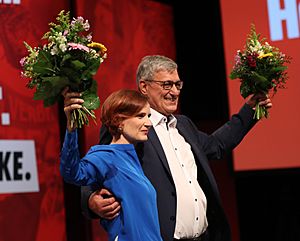
In her book, New Left Majorities: An Invitation, Katja Kipping suggests a new way of thinking about the economy. She calls it the "economy of commons." This idea means putting people's needs before profits. She believes in sharing resources, especially digital ones, so people can work together for the good of everyone. This could also make work easier for people. Another part of her idea is "infrastructure socialism," where basic needs like healthcare, housing, and transport are guaranteed for everyone.
Katja Kipping has often said that The Left party should work with other parties like the Social Democrats (SPD) and The Greens to form a government. She believes these parties could work together to make big changes for society and the economy. She pointed to Berlin's approach to its housing problems as a good example. She also supported the idea of a public vote to take over large housing companies in Berlin.
In national elections, Katja Kipping ran in the Dresden I area from 2005 to 2021. She usually came in second or third place. Her best result was 25.0% of the votes in 2013. In 2021, she came in second with 18.9% of the votes.
In August 2020, Katja Kipping and Bernd Riexinger announced they would step down as co-chairs. This was because party rules say no one should hold that position for more than eight years. Their successors were chosen in February 2021. Katja Kipping was replaced by Janine Wissler.
Senator in Berlin
On December 2, 2021, after the Berlin state election, it was announced that Katja Kipping would become the Senator for Integration, Labour, and Social Affairs in the Berlin government. She took office on December 21, 2021. She served in this role until the Berlin government changed on April 27, 2023.
Other Activities
In December 2007, Katja Kipping joined other politicians in a protest to support a group called Rote Hilfe e. V. This group helps prisoners. Katja Kipping left Rote Hilfe in March 2009.
She is also a founding member and board member of the Institute of Solidary Modernity. This is a left-leaning think tank that started in 2010.
See also
 In Spanish: Katja Kipping para niños
In Spanish: Katja Kipping para niños


